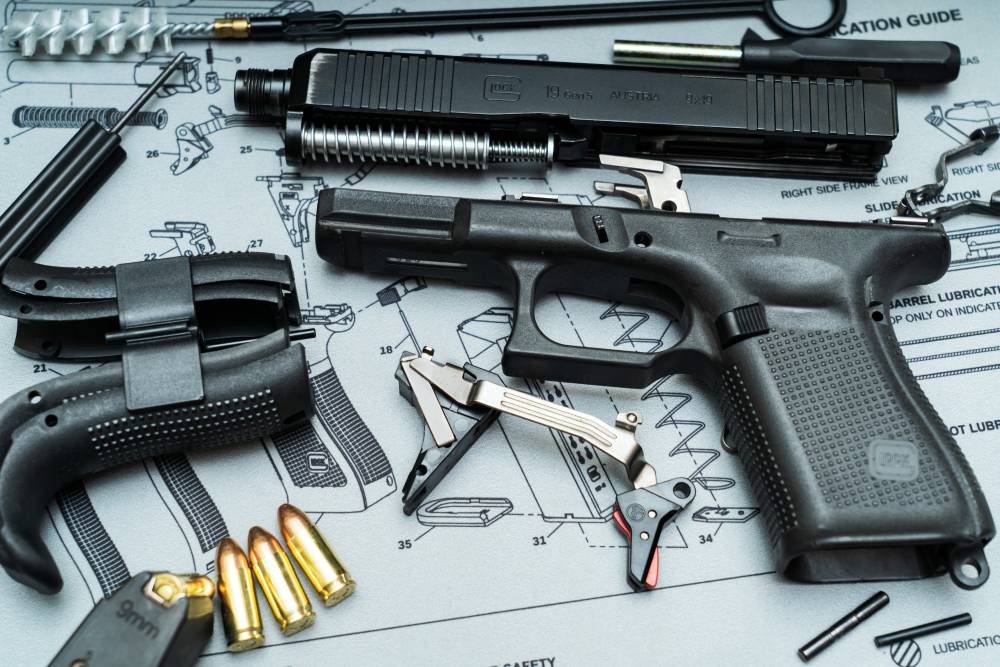In June 2024, at the 4th Review Conference of UN Programme of Action on Small Arms and Light Weapons and International Tracing Instrument (PoA/ITI RevCon4), States decided to establish an Open-Ended Technical Expert Group (OETEG) to develop recommendations to ensure the full and effective implementation of the PoA and ITI in light of developments in the manufacturing, technology and design of small arms and light weapons (SALW).
The expert group will meet during the 9th and 10th PoA/ITI biennial (BMS0/10) meetings of States in 2026 and 2028 to consider opportunities to strengthen PoA and ITI implementation. They will also determine ways to overcome challenges posed by new and emerging developments, in particular related to the use of polymers, modular weapons and 3D-printing. In addition, the expert group will propose concrete recommendations for strengthening international cooperation and assistance in this area.
To support substantive preparations for the OETEG, UNIDIR engaged partners and experts to prepare a series of three online briefings for the diplomatic community that will be involved in the expert meetings during BMS9 and BMS10. Drawing on the online briefings, UNIDIR will prepare a short insight report to support preparations for the expert group meetings.
Event recordings
Agenda
The online briefings introduced key technological developments relevant to the OETEG preparations, presenting challenges for PoA/ITI implementation as well as practical measures to strengthen effective implementation. The three briefings focused on the following thematic areas.
Briefing 1 | Use of polymer in manufacturing of SALW and marking, record-keeping and tracing for modular weapons
As early as 2011, States have pointed out gaps in the ITI regarding polymer frames and modular SALW designs. This first briefing introduced participants to the issues related to durable and recoverable markings of polymer frames, and the challenges associated with marking, record-keeping and tracing of SALW that use a modular design. It also outlined current good practice adopted by SALW manufacturers and discussed potential steps that the OETEG could consider.
Opening remarks
- Dr Benedikt Zanker, Head of Division on Conventional Disarmament and Arms Control, German Federal Foreign Office
- Ivor Fung, Head of the Conventional Arms Branch, United Nations Office for Disarmament Affairs
Presentations
- Paul Amoroso, Consultant at the Small Arms Survey
- Dr Rachel Bolton-King, Associate Professor of Forensic Science, Nottingham Trent University
- Thierry Jacobs, Independent Consultant for the small arms and light weapons industry
- Denis Jacqmin, Arms control, disarmament and non-proliferation section, Ministry of Foreign Affairs of Belgium
Moderated by: Ruben Nicolin, Associate Researcher, Conventional Arms and Ammunition, UNIDIR
Briefing 2 | Craft production and 3D printing of SALW: Key policy implications and effective measures
This briefing provided an overview of key developments in the space of non-industrial SALW production – from more traditional cases of artisanal production to the latest evolutions in the 3D printing domain. It considered key challenges posed by these weapons’ proliferation to arms control and relevant policy frameworks – particularly on implications for the UN PoA and ITI. It also offered a forward-looking perspective by discussing concrete examples of effective measures that the international community can leverage to address this growing issue.
Presentations
- Rueben Dass, Associate Research Fellow, International Centre for Political Violence and Terrorism Research
- Amina Mašović, Firearms Specialist, Operational Support and Analysis Directorate Firearms Programme, Interpol
- Adjudant-chef Antoine Museau, Ballistic Department of the Ministry of Interior, France
- Prince C. Kombay, Director of Technical and Programmes, National Commission on Arms and Ammunition, Sierra Leone
Briefing 3 | New and emerging technologies to help counter diversion
Despite the ability of technology to assist in safeguarding the transportation and storage of various goods, the uptake of new and emerging technologies to strengthen SALW control can appear slow due to security concerns and financial constraints. UNIDIR research has indicated that another factor for the limited use of new and emerging technologies to support PoA/ITI implementation relates to limited knowledge on available technologies and their strengths and weaknesses for SALW control. Therefore, this briefing provided an overview of how emerging technologies are or can be used to prevent and detect efforts to divert SALW.
Opening remarks
- Ivor Fung, Chief of the conventional arms branch, UNODA
Presentations
- Sarah Grand-Clément, Researcher, Conventional Arms and Ammunition, Security and Technology, UNIDIR
- Pier Angelli De Luca, Chief of Section, Conventional Arms, Munitions, and Explosives Section, Organization of American States
- Sylvia Paola Mendoza, Coordinator for Multidimensional Security, Mexico
- Rob Hunter-Perkins, Head of Research, Conflict Armament Research
Closing remarks
- Michael Geisler, Political Coordinator at the Permanent Mission of Germany to the UN, New York
Moderated by: Paula Soumaya Domit, Associate Researcher, Conventional Arms and Ammunition, UNIDIR
When and where
The event took place over three separate days, online via Zoom.
- Briefing 1: 29 October 2025, 15:00 CET / 10:00 EDT
- Briefing 2: 11 December 2025, 16:00 – 17:30 CET / 10:00 – 11:30 EDT
- Briefing 3: 10 February 2026, 15:00 pm – 16:30 CET / 9:00 – 10:30 EDT
Further information
For further information or questions, please contact cap-unidir@un.org.
